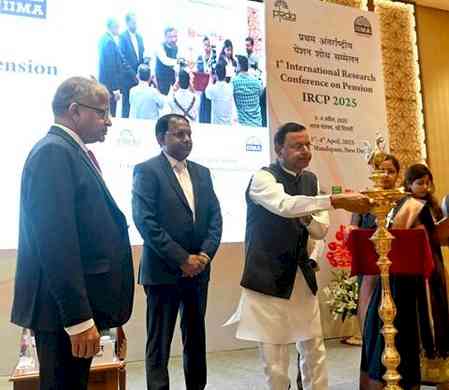BPO Promotion Scheme provides employment opportunities to over 40,000 residents in Tier 2 and 3 cities
The objective of these schemes is two-fold

New Delhi: The BPO Promotion Schemes by the Government of India has played a pivotal role in facilitating the expansion of BPO/ITeS companies in several Tier 2 and 3 towns across the country. In an endeavour to encourage establishment of BPOs in smaller cities and remote areas, the government launched two schemes, India BPO Promotion Scheme (IBPS) and North East BPO Promotion Scheme (NEBPS), under the Digital India programme. The objective of these schemes is two-fold i) generate employment for the youth in smaller/mufassil towns ii) promote balanced regional growth through investment in BPO/ITES sector. Software Technology Parks of India (STPI), an autonomous society under the Ministry of Electronics & Information Technology (MeitY) is the executing agency for IBPS and NEBPS.
In financial year 2020-21, IBPS has generated direct employment for more than 40,000 people residing in Tier 2 and 3 cities, out of which about 38% are women. The units have reported more than 3,000 additional employment generation in the last year. Interestingly, over 30+ of these locations reportedly had first-of-its-kind formal BPO/ITeS operation due to this initiative. The BPO Promotion Scheme has received an enthusiastic response from the industry to set up BPO/ITES operations across the country. Under the scheme, the highest number of employment generation has been reported in Andhra Pradesh (12,234), followed by Tamil Nadu (9401), Punjab (4463), Odisha (2493), Maharashtra (2353), Jharkhand (2256) and Bihar (1551). Among the cities, the highest number of employment generation has been reported in Visakhapatnam, Andhra Pradesh (7738); followed by Coimbatore, Tamil Nadu (4908); Mohali, Punjab (4453); Ranchi, Jharkhand (2162); Bhubaneswar, Odisha (1901); and Patna, Bihar (1324).
Commenting on this, Dr Omkar Rai, Director General, STPI said “The BPO Promotion Schemes have received an overwhelming response from the BPO industry. Currently, 252 BPO/ITES units are operational on 47,043 seats under the scheme. These units are distributed across the country in more than 100 cities/towns of 27 states/UTs. Information Technology, telecom, e-commerce, fintech and healthcare are dominant sectors driving the demand for BPOs. Traditionally, the Indian BPO/ITES sector grew and was centered around a few metropolitan cities. This forced youths from other locations to migrate to metro cities for jobs. The scheme has helped thousands of local youths to get employment at their native places and also helped in attracting investments in the regions. Moreover, it has led to the establishment of BPOs in cities hitherto untouched by the BPO/ITES wave, such as Baitalpur, Mayiladuthurai, Bhimavaram, Majuli and many more.
The IBPS scheme seeks to incentivize the establishment of 48,300 seats with respect to BPO/ITeS operations across Tier 2 and 3 cities in India. Similarly, the NEBPS scheme aims to incentivize the establishment of 5000 seats in respect of BPO/ITeS operations in the North Eastern Region. The government provides financial support up to Rs 1 Lakh per seat as Viability Gap Funding (VGF) for setting BPO/ITES operation in non-metro locations through this scheme. The value propositions of smaller cities and support from the government have motivated several organizations to establish their base in Tier 2/3 cities.
Dr Omkar Rai further added, "India continues to be a leader in the global sourcing industry. According to an estimate, India currently accounts for approximately 38% of the global market share of BPOs. The Indian BPO industry is currently pegged at $38bn and is expected to be worth $54bn by 2025.To maintain the leadership, it is imperative for India to unlock the vast potentials of smaller cities, and the BPO Promotion scheme has made some great strides in this direction. It is noteworthy that more than 60 BPO/ITES units under the scheme are successfully delivering services to global clients of at least 16 countries. ”
For business continuation during COVID19 pandemic, last year, the Government of India announced the new simplified Other Service Provider (OSP) guidelines. This was aimed for the BPO, and IT Enabled Services (ITES) sector to reduce the compliance burden for the industry and facilitate 'Work from Home'. These new guidelines provided the much-needed impetus to the BPO sector and are helping the industry sail through the pandemic. Further, to sustain the operation of BPO/ITES units under the BPO Promotion Scheme smoothly during COVID-19 pandemic, several timely relaxations were introduced, such as reduction of minimum employment criteria for VGF claim, provision for a one-time waiver, extended timeline to commence operation etc. These relaxations helped more units to receive financial support under the scheme.
The outcome of the BPO Promotion scheme has proven the viable model of expanding India’s BPO/ITES business from metros to smaller cities, which is a testament to the fact that with the right policy and focused efforts, desired objectives can be achieved. These locations have many benefits to offer, such as lower operational cost, lower attrition rate, dedicated employees etc. IT is an enabler and BPO/ITeS industry of India is already acclaimed as best in the world. Now it’s time to reap the benefits of the strong foundation that has been laid through this industry for creating a ripple effect even in smallest part of the country and to empower the youths of the regions so that they can play a seminal role in social economic upliftment of the regions.


 cityairnews
cityairnews 








